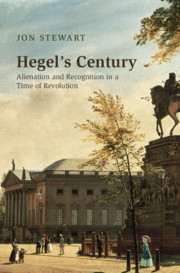Book contents
- Hegel’s Century
- Hegel’s Century
- Copyright page
- Dedication
- Contents
- Acknowledgments
- Preface
- Introduction
- Part I The Beginning
- Part II The First Generation
- Part III The Second Generation
- 6 Marx’s View of Religious and Political Liberation
- 7 Kierkegaard’s Analysis of the Forms of Despair and Alienation
- 8 Dostoevsky’s Criticism of Modern Rationalism and Materialism
- 9 Bakunin’s Theory of Anarchy
- 10 Engels’ Criticism of Feuerbach and Classical German Philosophy
- 11 Hegel’s Long Shadow in the History of Nineteenth-Century Philosophy
- Bibliography
- Index of Names
- Subject Index
10 - Engels’ Criticism of Feuerbach and Classical German Philosophy
from Part III - The Second Generation
Published online by Cambridge University Press: 14 October 2021
- Hegel’s Century
- Hegel’s Century
- Copyright page
- Dedication
- Contents
- Acknowledgments
- Preface
- Introduction
- Part I The Beginning
- Part II The First Generation
- Part III The Second Generation
- 6 Marx’s View of Religious and Political Liberation
- 7 Kierkegaard’s Analysis of the Forms of Despair and Alienation
- 8 Dostoevsky’s Criticism of Modern Rationalism and Materialism
- 9 Bakunin’s Theory of Anarchy
- 10 Engels’ Criticism of Feuerbach and Classical German Philosophy
- 11 Hegel’s Long Shadow in the History of Nineteenth-Century Philosophy
- Bibliography
- Index of Names
- Subject Index
Summary
Chapter 10 is dedicated to Friedrich Engels, who studied in Berlin at the beginning of the 1840s. The chapter explores Engels’ short monograph entitled Ludwig Feuerbach and the Outcome of Classical German Philosophy. In this work he gives a critical evaluation of German philosophy and speaks with nostalgia of the important role of Hegel and Feuerbach for the development of his thought and that of his collaborator Karl Marx. Engels claims that the radical nature of Hegel’s philosophy lies in its dialectical methodology. While it might at first glance look like Hegel is attempting to glorify the actual, in fact his theory shows that everything that arises in history appears at a specific place and under specific circumstances, and in time everything grows old and decays, at which point it is replaced by something new that is better suited to the new situation. This is a recipe for criticism and revolution. It is argued that Marx and Engels also further develop Hegel’s idea of self-conscious and alienation into a theory of class consciousness.
Keywords
- Type
- Chapter
- Information
- Hegel's CenturyAlienation and Recognition in a Time of Revolution, pp. 258 - 281Publisher: Cambridge University PressPrint publication year: 2021

